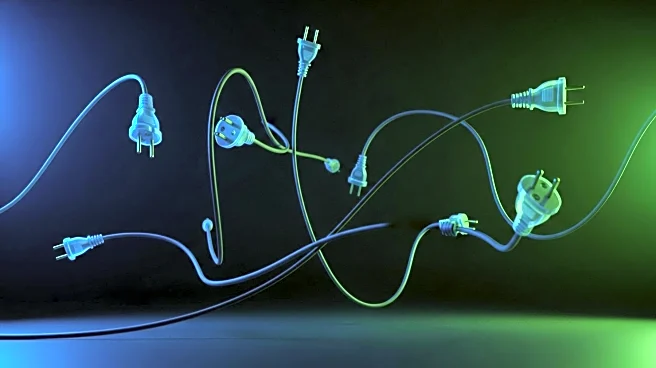What is the story about?
What's Happening?
Phantom energy, also known as vampire energy, refers to the electricity consumed by devices that remain plugged in even when not in use. This phenomenon accounts for approximately 5% to 10% of home energy use, according to Alexis Abramson, dean of the Columbia Climate School. Devices such as smart TVs, phone chargers, and microwaves are common culprits. These appliances can draw significant power, contributing to increased demand for electricity from sources that emit greenhouse gases. Efforts are underway to reduce this energy waste, including voluntary agreements by manufacturers to lower standby power consumption in smart televisions. Aidan Charron, associate director of Global Earth Day, emphasizes the environmental impact of phantom energy, urging individuals to unplug unused devices to save money and reduce emissions.
Why It's Important?
Phantom energy significantly impacts the environment by increasing demand for electricity, which often comes from fossil fuel sources. This contributes to climate change through higher greenhouse gas emissions. The cumulative effect of phantom energy across millions of households can lead to substantial environmental degradation. By reducing phantom energy consumption, individuals can lower their carbon footprint and contribute to broader efforts to mitigate climate change. Jonathan Gilligan, a professor at Vanderbilt University, notes that individual actions can collectively reduce U.S. emissions by about 20% annually, highlighting the importance of personal responsibility in environmental conservation.
What's Next?
Efforts to combat phantom energy are likely to continue, with increased advocacy for unplugging devices and optimizing appliance settings to minimize energy waste. As awareness grows, more individuals may adopt sustainable practices, potentially leading to societal norms that prioritize energy efficiency. Manufacturers may also innovate to create more energy-efficient products, further reducing phantom energy consumption. These actions could contribute to a significant reduction in greenhouse gas emissions, aligning with global climate goals.
Beyond the Headlines
The issue of phantom energy raises ethical considerations regarding consumer responsibility and environmental stewardship. It challenges individuals to consider the broader impact of their daily habits on the planet. As society becomes more aware of these hidden energy costs, there may be increased pressure on manufacturers to design products that minimize standby power consumption. This could lead to a shift in consumer expectations and demand for more sustainable technologies.

















